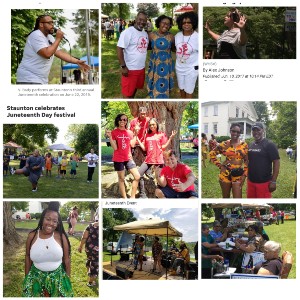By Rebecca J. Barnabi
For Augusta Free Press
The American Civil War was over, but, without social media and television, news spread slowly.
On June 19, 1865, Union General Gordon Granger rode into Galveston, Texas with between 2,500 to 3,000 of his troops.
He announced that the war was over and that the Emancipation Proclamation, signed in January 1863 by the late President Abraham Lincoln, meant all black Americans were free of the bondages of slavery.
“It was just one small step toward independence for African-Americans,” said Sheila Ahmadi, co-founder of the Shenandoah Valley Juneteenth Celebration.
Freed slaves did not own property, have money or have anywhere to go when the war ended.
Many stayed on the plantations they had lived on during and before the war, while others moved away to start over.
However, Ahmadi said, a “reign of terror” began against freed slaves. White farmers and plantation owners did not want them to have their freedom from slavery.
Blacks could not vote or congregate. White Americans continued to decide what black Americans could or could not do.
“They couldn’t participate as a full citizen,” Ahmadi, who lives in Staunton, said.
On Saturday, the fifth annual Shenandoah Valley Juneteenth Celebration will be held from 9 a.m. to 5 p.m. at the Frontier Culture Museum.
“I think history tends to repeat itself in good and bad ways,” Ahmadi said. June 19 is a day to recognize the struggle of blacks.
She said blacks in the U.S. continued to have limited rights until the Civil Rights Movement in the mid-1960s.
“That truly began to open up the doors [for blacks],” Ahmadi said.
For a long time in history, according to Ahmadi, blacks were made to feel ashamed of their past history in the U.S. Meanwhile, Jews were not made to feel ashamed of what happened to them in the Holocaust.
Since the Civil Rights Movement, blacks have made progress by entering career fields of law, medicine and the arts, and holding office in state legislature.
“It’s a rich history, and it’s one that should be celebrated continuously,” Ahmadi said.
In the early days of celebrating Juneteenth, Ahmadi said that newly freed slaves gave speeches about their experiences as slaves.
On Saturday, live music, including rap, rhythm and blues and gospel, will be performed, educational tours will be available, a cornhole tournament for adults and the making of African masks from brown bags for youth.
An old black church at the Frontier Culture Museum in the 1760s settlement will be open for tours.
Voter registration will be available and raffles will be held for a bicycle, gift cards and other prizes.
Augusta Health staff will be in the Frontier Culture Museum barn from 9 a.m. to 2 p.m. to administer COVID-19 vaccinations.
Food trucks, including Backyard Gourmet, will also be available.
Ahmadi said everyone is invited to bring family and friends and “come out for a great celebration of history and connecting.”
George Hunter founded the Staunton Juneteenth Celebration with Ahmadi five years ago. He said they changed the name so as not to make anyone feel excluded from attending.
Hunter, who lives in Fishersville, said “giving people insight why Juneteenth exists” is important in order to raise awareness and celebrate culture in the U.S.
While the Emancipation Proclamation was signed by Lincoln in 1863, slaves were not free until the war ended in April 1865.
“Regardless of our history, regardless of our downfall, we can still find things that will benefit our race” and other races, Hunter said.
Juneteenth is not just about celebrating the history of blacks in the U.S. but celebrating the future.
“It is historically about slavery, but what we wanted to do with our Shenandoah Valley Juneteenth is bring us together as a society,” Hunter said.
All races in the U.S. according to Hunter, need to find common ground and move forward in order to enhance our country and our neighborhoods.
“How we can co-exist as races,” Hunter said.
Holding this year’s celebration at the Frontier Culture Museum is “a win, win right there,” he said, because the museum is all about celebrating diverse cultures in U.S. history.
“What history tells us — it shows how communities, African-American, Caucasian, Hispanics, can all come together,” Hunter said.
And coming together now to celebrate on Saturday is more important than ever.
“It’s about just coming together with everything that’s happened in the last year, year and a half. We need this,” Hunter said.
Coming together will make Americans stronger.
Participants are encouraged to dress for hot weather Saturday, and bring lawn chairs.











